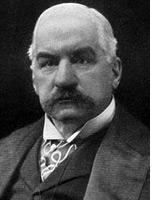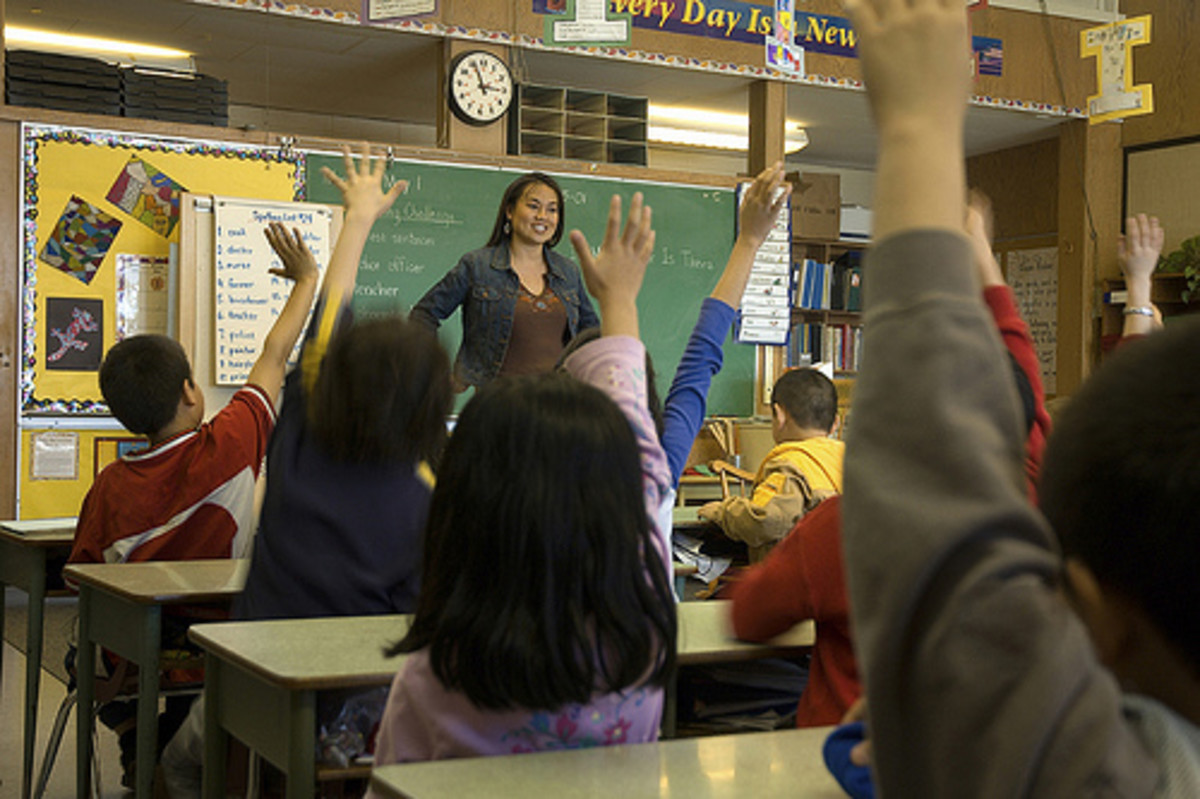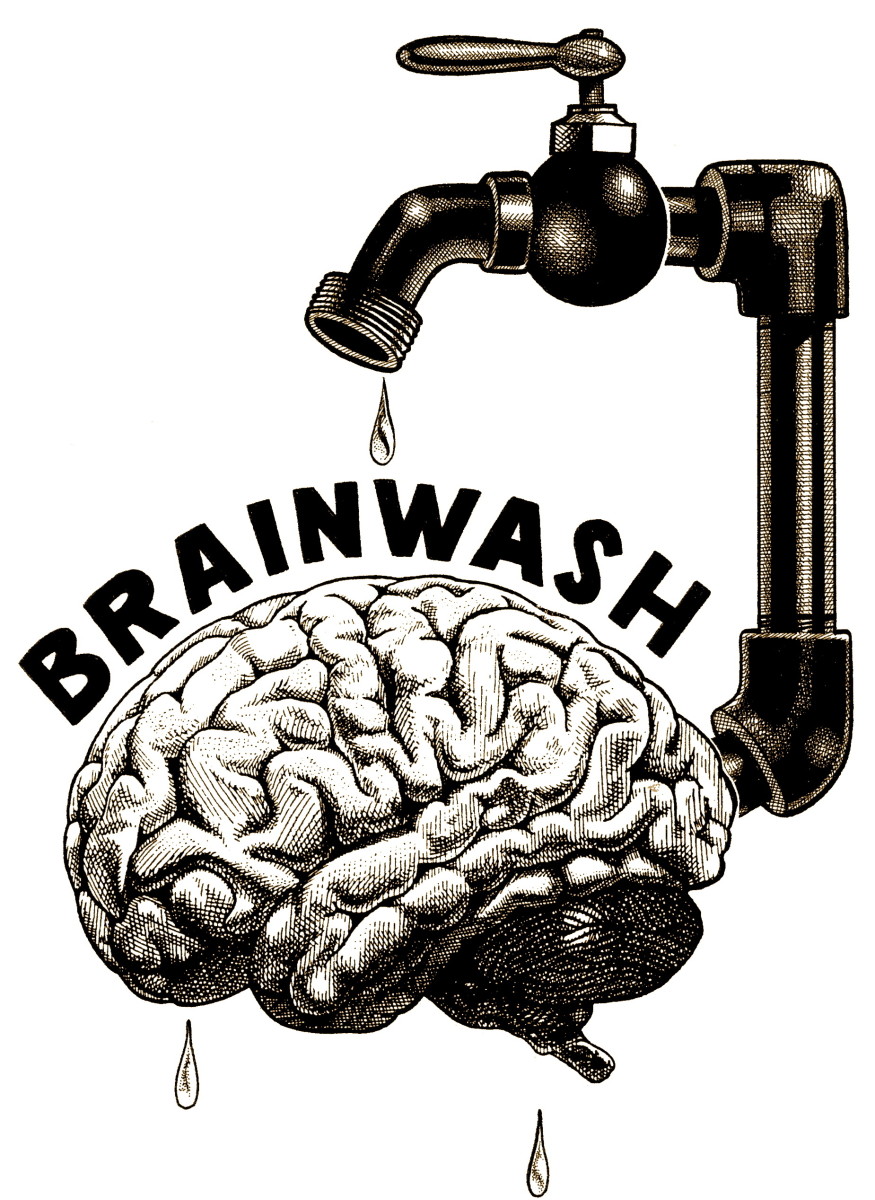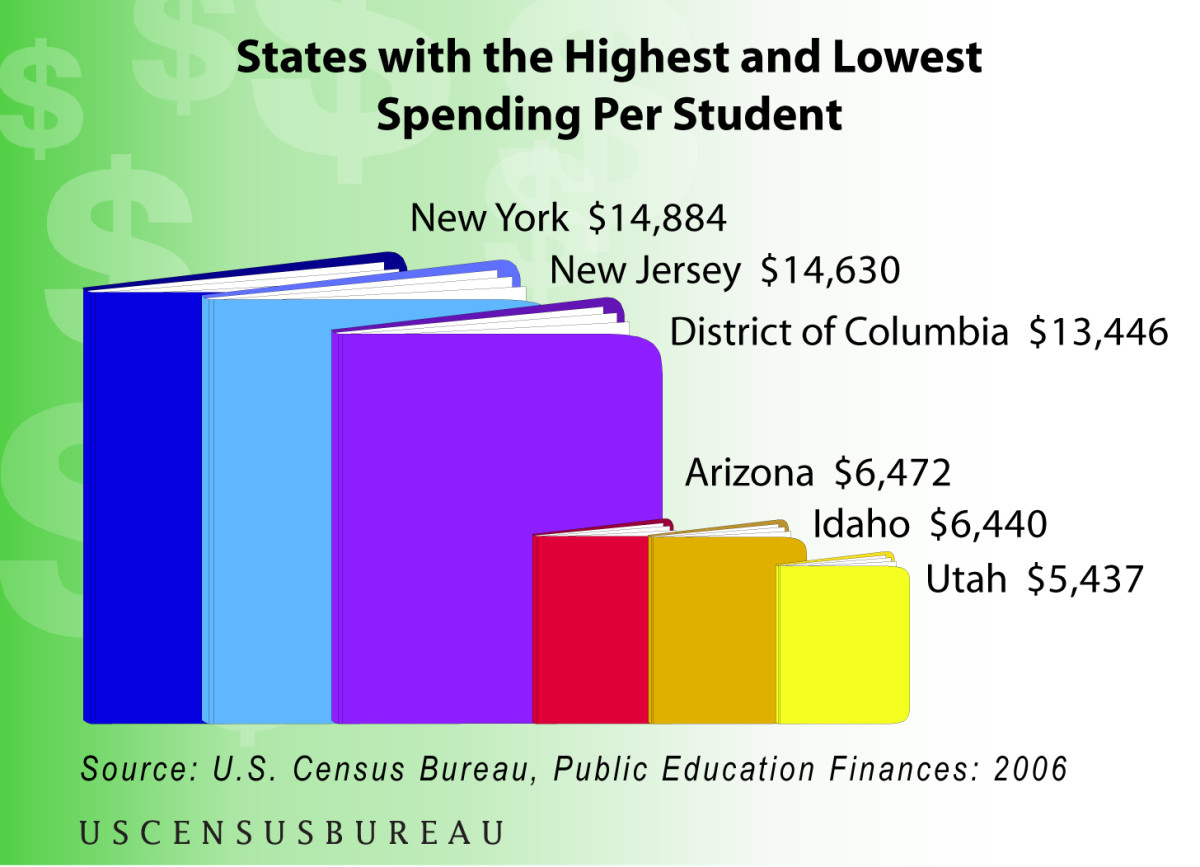Has The Socialist Agenda Taken Over Our Schools? A Response To A Great Comment!

Personal Aside:
Wow! This is some comment! I appreciate you taking so much of your time to write it. It let's me know that at least one person has taken a moment to put some thought into the questions being raised. Thanks.
For original article click here.
*****************************************************************************************

The Response:
First of all, let me say this: Wherever you may find yourself at any given point in time, is a result of all your accumulative past actions. When attempting to find a logical answer to any question of why or how, the natural thing to do is to retrace our steps until we find what we believe to be the exact point of divergence from our purpose. You seem surprised that I may think a 70 year old question is still being debated. The arguments between content and methodology goes on to this very day. Look at the heated arguments over creationism and evolution.(content) Take a look at the travesty called “Invented Spelling.” (methodology) That alone is a pure example of Dewey's screwy psychobabble.
You asked “why in the world would we be debating either of these guy's philosophies of the method and purpose of education?” Are you really asking me that? I wasn't discussing the purpose of education, but rather the purpose of the public education system, and until we are all in agreement about that purpose, we will constantly be in a state of flux. We've been getting nowhere for the last 30 years since it was first acknowledged that our educational system isn't working.
Your statement that “school is a means for social change” is the very same belief that John Dewey perpetrated on society a century ago. How a society interacts within itself, and with those outside, is determined by a selected set of beliefs. There is no better place in the world than a school for changing the way a society think and acts when you look at its usefulness toward indoctrination of the masses. Whoever controls the schools, (the choice of content, the methodology, the accepted behaviors of all, etc) is in control of the direction of which a society will move. Prior to Dewey hitting the scene, school was only seen as an institution for teaching facts. Today, we are more concerned with the social aspects of school than we are with the act of teaching and learning.
As for being a socialist plot? You must remember what was going on at the time John Dewey gained recognition. I don't believe for one moment that he holed up in some darkened corner with Kilpatrick and hammered out a plan for taking over the world. The fact remains that John Dewey and William Kilpatrick were self-proclaimed socialists. Their beliefs centered around socialist ideals and they spoke of those ideals to all who would listen. It's only common sense to understand how their beliefs would find their way into the work they were doing. But I believe I questioned whether they were truly socialists, or merely presenting themselves as such.
Education is a great equalizer in societal circles because knowledge is power. Knowledge allows people to better their station in life, opening doors otherwise closed to them. Kilpatrick's successful efforts to remove many academic subjects from the curriculum, and his stated belief that only a select few had a need for the education being offered up to that point, would point more toward an effort designed to keep the classes widely separated.

J.P. Morgan funded Dewey. If you know anything about the activities of J.P. Morgan, you can understand why I raised the question. Morgan liked control. He used his money to build great monopolies, putting him in a position of calling the shots for all of New York, and even the US government, at one point. He controlled all railway transportation, so in effect, he had a lot of control in business issues across the entire country, and he was completely in control of Wall Street and the banking industry. I believe he saw the appeal of Dewey's “schools are for telling children HOW to live” from the perspective that it was a surefire way to keep the competition down, and keep people in their proper place by his standards. The elite members of society were relatively few, but there had been a growing number of self-made men disturbing their circles. The “Old Guard” didn't like it.
So rather than J.P. Morgan going for the socialistic changes which were Dewey's proclaimed intent, it was more of a fascist direction. The only difference between communist socialism and fascism is that the government is run by a committee who determines policy and hands down governmental decisions. In a fascist government, the authority of government rule rests with a dictator. Both systems advocate the elimination of private ownership of businesses, opting for government ownership and control for the good of all the people. You might wonder why someone such as J.P. Morgan, who had amassed great wealth for himself, would embrace such an ideal.
Morgan was not a self-made man, contrary to popular belief. He was born and raised in the lap of luxury. When he died in 1913, his personal wealth was extremely small in comparison to other giants of his time. John D. Rockefeller, after Morgan's worth of $80 million was made public following his death, commented , “And to think, he wasn't even rich!” Morgan's power did not come from the extent of his personal wealth, but from the billions of dollars he controlled. He liked control. He had, for all intents and purposes, gained total control of New York, and the nation's economy. How much more enticing would the lure of controlling everything and everyone in the country be to a man who was known for his brutal dispensations of polite manners when dealing in business? He walked over people, and wasn't averse to crushing them beneath his boot if they didn't meet with his demands. His obituary called him a brute with a barbarous code of ethics. He was described as “chicanery” and achieving victory over innocence.
You compared the scholastic content of the past to that of the present in your examples of algebra and calculus. Algebra was taught in the schools more than a century ago, as was philosophy and great literary works of the ages, etc. Students were taught much more at younger ages. I've included a link to an 1895 exam given to students in the 8th grade. Passing it was required before moving up to high school. If you can pass it without any trouble, you're better than everyone I know, who has taken a shot at it! Oh, and incidentally, they're still teaching the Columbus discovery story. My grandchildren have each done reports on the topic for their schools. Two of them went to a different school district than the other two at the same age, so it's not limited to a particular school district.
You mention the changes made in schools in regards to “you can't beat down a kid much anymore.” Beat down? Really? A century ago, and beyond, if a student acted out in ways considered inappropriate, he might get his knuckles rapped with a ruler, or a swat or two with a paddle, but most punishments were of the humiliating brand, like the old dunce cap routine. Standing at the front of the classroom facing the chalkboard, or in a corner, writing 100 times,etc, were all methods of punishment. The idea was to teach the one acting out that unaccepted behavior will draw unwanted attention, put the perpetrator in a position of paying for his acts, in addition to bringing on shame to his parents, who would then mete out their own brand of justice.
We have been so sensitive to “hurting their feelings” or “undermining their self-confidence” that we stopped using sensible ways to deter children from repeating mistakes. I'm not advocating physical punishment, by any means, but there is a proper way to teach kids right from wrong. And it isn't by destroying the rest of their lives because of one act of indiscretion, or a lack of judgment. There are reasons children are not given the right to make contractual agreements, to drive cars, to indulge in tobacco or alcohol before certain ages...they have not lived long enough to witness (gain experience) how decisions made will affect outcome. We now know that the human brain continues to grow and develop well beyond 18 years of age. We also know that hormones have a definite influence on thinking processes. We have become a society so intent on punishment, that it has become a way of life, even in our schools.
I'll give you an example. In the 60's and 70's, physically fighting wasn't anymore acceptable than it is now. In fact, I'll venture to say it was less acceptable by all, including students. If a fight broke out, the rest of the students tended to watch apprehensively, or tried to stop it, either with words or by stepping in. Today, it's recorded on cell phones, kids gather around screaming encouragement, and many times, a mob jumps in and it becomes a free for all. Why do you think that is?
Forty years ago, if a fight broke out, the students were punished by having privileges taken from them, such as lost recesses, or no admittance to school functions such as pep rallies, sports events, or dances. Their social life was curtailed for a specified amount of time. They also might have to deal with expulsion, or in-school detention. They were sat down with either the guidance counselor or the principle who took the time to discover what the issue might be. Suggestions for conflict resolution were offered. Back then, we didn't punish children for being children, for making the mistakes of children. We guided them by teaching them other ways. The punishments fit the crimes. They were free afterward to go on with their lives, given the opportunity to use their hard lessons as a reminder to do the right thing.
Today, we call the police at the drop of a hat. These kids are arrested, some thrown into adult jails even before they are tried and convicted. We hold them up, shaking their plight in the faces of their peers and warn them that they are just a step away from the same sad ending. We don't teach them right from wrong, we threaten them. We demand they make good choices right off the bat with nothing but our word for what is good. We use threats and coercion as a means to our end, but we tell them they must employ compassion and understanding. We want them to recognize a peer's immaturity when they say or do hurtful things, and not react to them. We as a society do NOT model what we keep telling our children is right and proper. And if they don't get it, we throw them away along with their futures.
You mention the piles of homework brought home these days as compared to...when? A century ago, curriculum outlines recommended ½ to 1 full hour of homework for grades 1 and 2, 1 - 1 ½ hours for grades 3 and 4, 1 ½ - 2 hours for grades 5 and 6, and 2 – 3 hours for 7th through 12th. They also went to school for longer hours, starting earlier in the morning, but their days were broken up by recess periods strategically placed. There was a mid-morning recess and a mid-afternoon one. Lunch hours were just that..an hour. These breaks allowed children to expend energy and rest their brains a bit. We all know how exercise “wakes” us up. We also know that when children are stuck inside the same four walls for long periods, they tend to get rambunctious and fidgety. Put your children in the same room for three hours straight. Don't let them move out of their chairs or at least beyond a certain boundary, and only give them a very small choice of materials on which to direct their attention. TV and computers are out. Watch what happens. Watch how aggressive they can become, how short tempers begin to flare after about 2 hours, if they even last that long.
When the smaller classrooms issue became the focus, we rushed to build more schools to accommodate the need for the extra classrooms. But then, maintaining them, and staffing them, and supplying the basics like water and heat and electric, all became so expensive. School districts began shutting down the smaller schools in favor of building complexes. The problem with that is now we have a much greater need for providing transportation for many students. Some students travel as much as an hour on their buses each day.
My grandchildren live behind their elementary school. It is about a ten minute walk. The trouble is that they would have to cut through their neighbor's field to get there. The neighbor doesn't mind. The school does, because it's not a “proper” route. Instead, they must catch a bus that takes them on a very circuitous route lasting 45 minutes. The distance traveled and the constant stopping to pick up students requires them to leave earlier and arrive home later, than if they had walked. They literally spend the exact amount of time getting ready, traveling and attending school as I did 40 years ago, but I actually had an hour more of in-school instruction and I walked a distance of just under a mile. What is even more baffling is the fact that teachers are now given a “free” period, but the children have lost their recesses. Why? So the mandatory 5 hours of instruction per day requirement is met. How effective is that instruction if the students are disinterested and fidgety, not to mention feeling a bit cranky. The justification for lost recesses is that the day has been shortened. Well, maybe for the teachers and staff, but certainly not for children. I know quite a few teachers who aren't even out of their pajamas by the time my grandchildren are stepping onto the bus.
You observed that current social change being pushed in today's schools is dramatically more conservative than liberal. I believe you may have made my point in a somewhat roundabout manner. A truly conservative person is one who holds to traditional attitudes and values. He is not readily open to new ideas, change, and innovation. There is nothing traditional about our methods of educating our children. We have adopted one bad idea after another in what we've been told is the pursuit of providing better education. All the evidence points out that these new ways aren't working, but we allow ourselves to be led down the disastrous path first embarked upon by proponents of Dewey and Kilpatrick. “...the bigger debate is HOW we teach, how we structure our schools.” That, my friend, is what is meant by methodology, exactly my point.
“We are STILL in these two guy's worlds...” Again, my point exactly. However, I believe their worlds revolved around a much different agenda than finding the perfect way to educate children. If that agenda was truly the purpose behind the changes made at that time, then we are unwittingly continuing the process.
You mention the testing circus. I'm in agreement with you on that one. But let's remember, our education system was in the toilet long before the testing fiasco took root. If you remember, I commented in my original article that money is always the reason behind the madness. Find out who formulates the tests, who grades the tests, and who is responsible for analyzing the results and putting them into a report. They are the ones making money off of this. In turn, the added expenses associated with the costs can be used as a way to extract more tax money for programs “designed to meet the obligations” (standards) required. It's a game being played at the expense of, not only our children, but the entire nation.
If you found this information helpful, please pass it on by clicking the Tweet, Like, or +1 button provided at the top of the page.
- Has The Socialist Agenda Taken Over Our Schools?
John Dewey and William Kilpatrick were strong advocates for changing the way American students were taught. Did changes in methodology and content beginning in the 1920's contribute to a nation full of under educated graduates? Have so called new met - Inventive Spelling: A Misguided Effort Towards Real Education or A Sinister Plot To Dumb Down The Po
Inventive spelling has been touted as the latest and greatest method of educating our children to communicate the written word. However, the fact that college graduates aren't able to spell even the most rudimentary of words, and the results of natio - Wealth Inequality or The Great Divide
Inequality of wealth and income. It is an issue of great importance to America's disappearing middle class. What and who are the culprits? How did we go from a nation filled with American Dreams to a nation of people tottering on the brink of ruin an - Are We Multi-tasking Our Children Into Attention Deficit Disorder?
Recent studies have indicated that the ability to multi-task is nothing more than a myth. Moreover, it causes low levels of productivity and may be rewiring our brains to process information differently, not allowing for focused critical thinking. Is









